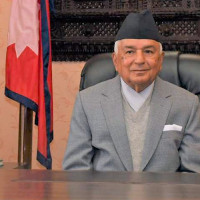- Thursday, 19 February 2026
English Subculture In Our Schools
English as a second language has received a mix of sympathetic and critical opinions in Nepali society lately, possibly not due to Anglophobia but rather because of the growing awareness of the need to preserve and promote one's own languages and cultures. But we should not forget to factor in the ground realities of our society while doing so. Therefore, how about creating a ground where English and our languages coexist? We, after all, need our mother tongue as well as English for different valid reasons.
Dedicating some time and energy to improving English should not be considered to be synonymous with destroying our own language and culture, as long as it does not amount to replacing everything in our public domain with English. Governments trying to replace our Devanagari script with English alphabets in the name of embossed number plates in vehicles and private schools embracing "good morning" culture over our distinctive culture of "namaste" are two examples of it.
Language acquisition
Language acquisition has more to do with skill and less to do with knowledge. Schools should work in that direction as a facilitator, not as an impedimental agent. So, the "English-only" subculture adopted by many schools will rob students of their creativity and imagination. The moment English becomes the common goal, no one shames others for failing to speak English and no one has to feel ashamed at floundering because all of us are bound by the shared goal-the acquisition of English as a second language. It sounds acceptable and logical enough to make school children up to basic level education to read a rudimentary level of the indigenous language of that demographic region. For example, schools in Kathmandu metropolis teach the Newari language up to a basic level.
We all should feel free to adopt a code-switching approach in second language acquisition. That goes a long way towards lowering the affective filter, something very crucial for smoothing the path to acquiring a second language. This is best explained in the book Principles and Practice in Second Language Acquisition by an American linguist, Stephen Krashen. He lays out five hypotheses about the acquisition of a second language. The essence of them says that we acquire a language when we are given comprehensible input in anxiety-free situations and when we are presented with interesting and meaningful ideas that we actually understand. "Comprehensible input" implies availability of books and listening sources that help them whet their interest to ask for more of such things.
Researchers have long established the fact that there is a cognitive benefit to learning a new language. That aside, it has professional and social benefits. Because of your new language, you can expand your social circle. You can get new opportunities that will add to your professional growth. I remember a real-life situation of my two friends who used to teach Sanskrit up to a basic level in a school in Kathmandu. Both of them were Sanskrit graduates growing almost in parallel in their teaching careers. But one used to go the extra mile and pick up English, and over so many years of doing so, he had a praiseworthy command of English.
On the other hand, other friends always seemed disenchanted by the idea of putting in extra effort to improve their English. A time came in their professional lives when their principal had to select one of them for a Sanskrit seminar to be held in England under the invitation of a reputed university. The offer was considered to be a fulfilling experience both professionally and financially. The first one was selected, given his command in English, although the second one was the deserving person on the basis of seniority or something internal. He ended up feeling bitter and short-changed.
Influence
The English language has a telling influence in societies like ours rather than in societies like that of South Korea, Japan and many European countries because they can afford to ditch English. It's a pity that we cannot. It boils down to being self-reliant economically, which we are not. From education to technologies to diplomatic relations with donor nations, English has been our integral part. English is no longer the prerogative of Englishmen. Users from larger political and social spheres of influence enjoy greater leeway in customising English language as per their needs.
They have a larger say in linguistic evolution, too. That's one of the reasons why varieties of English exist. It's pointless to get paranoid about it posing a threat to our own language. There are entirely different ways of safeguarding our language and culture at the governmental level. The government's decision to teach social studies in the Nepali language is truly laudable. It makes perfect sense to teach and learn about our society in our own language.
On the flip side, if the medium of instruction is made Nepali for high school and tertiary education for subjects like science, math, engineering, and information technology, it will not serve the purpose. Nepali students cannot afford to put the English language on the back burner. Merely harping on nationalistic one-liners will not help us safeguard our culture and identity. Let us not teach and learn it, leading to subtractive bilingualism. If anything, let us accept it as additive bilingualism. This leads to the situation when the English language doesn't have to be glorified and should not be trivialised either.
(Author mentors students in creative writing at Sanskar Pathshala, Dang)
















